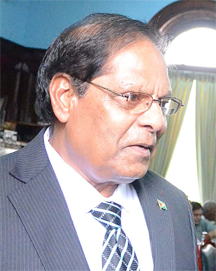Despite calm emerging from the Corentyne congress of the ruling political party, a brewing storm raged on Saturday in secret voting for its leaders, former PPP stalwart, Moses Nagamootoo, says.
The ruling People’s Progressive Party (PPP) last weekend held its first congress in five years to elect its leaders after slumping support at national elections in 2011 when it lost its parliamentary majority but won the presidency by virtue of plurality.
“At this congress, there was a massive rejection of the PPP leaders,” Nagamootoo told Stabroek News yesterday.

Party leaders faced their loyal and faithful members under a dark cloud, as for the first time in two decades the party finds itself in an intense battle to govern, and execute its prestige projects in an opposition-controlled Parliament.
Members daily face high-profile media reports of their party’s immense battles in Parliament against the majority Opposition, which sees ambitious projects like Amaila Falls and the upgrade of the international airport come under intense scrutiny over claims of corruption.
Nagamootoo stands in Parliament as a member of the Opposition party, the Alliance for Change (AFC), and takes a lead role in demanding Parliamentary oversight over Government, and for control over perceived party excesses.
Reacting a day after the PPP congress elected the 35 members of the new Central Committee, the Party’s highest leadership forum, Nagamootoo said “it is instructive that 200 or more members of the party delegates with voting rights chose not to vote for the two most powerful party leaders”.
He said of the 1,097 eligible voters, only 886 voted for the leader, Donald Ramotar, and 851 voted for Bharrat Jagdeo. “Ramotar is the sitting President of the country, and the Party’s General Secretary, and Jagdeo is the immediate past President of the country, and they failed to win the votes of over 200 of their loyal party members. That’s 20 percent of the eligible voters who refused to recognize these powerful figures as their leaders,” Nagamootoo said, noting that, “even with spoiled ballots taken into account”, the rejection is “massive. They suffered a rejection of 20 percent of eligible voters”.
He said “here you have the powerful former President, and the sitting President, who also is the reigning General Secretary, plus all the lobbying and campaigning that these leaders employed to win votes, and yet we see a 20 percent rejection rate. The popularity rating of party leaders took a bad beating at this congress”.
“This is not the political party I know and served for so many years, since I was 18 years old in 1965. This is a pseudo-PPP, which explains why voters rejected their leading candidates,” he said.
“I have attended every congress since 1965, except this one,” Nagamootoo said, noting his boycott of the 2005 congress. “In 2008, I was elected with the fifth highest number of votes to the Central Committee”. He first got elected to the Central Committee in 1976, the year that several then party leaders, including Ranji Chandisingh and Vincent Teekah, crossed the parliamentary floor to the People’s National Congress of Forbes Burnham.
“I remember at one congress, the then leader, Dr Cheddi Jagan, lost one vote, and the Party showed real concern. We respected the loyalty and faithfulness of the membership. Loyalty to the leaders came as a natural love for our leaders. What we saw happened in Corentyne at this congress shows a lack of loyalty and trust – and a heavy dose of rejection,” he said.
Nagamootoo said the party drew up a list of 1,500 eligible voters who took part in the congress with the task of electing the Central Commit-tee, the Party’s highest and most powerful forum, comprising 35 members, and out of which the 15-member Central Executive, along with the General Secretary of the party is elected.
Of the 1,500 voters, 1,097 were eligible, with others ineligible “for various reasons”, at this congress, Nagamootoo said.
Nagamootoo said the results at this congress may be a serious sign that party members are losing their loyalty to the existing leadership clique. “This party is not as solid as it needs to be to stay in power. This congress reflects apathy and withdrawal,” he said.
Nagamootoo said he resigned from the party after the 2008 congress “deteriorated to a pantomime. I was always criticized in the party, as I am always fighting against corruption and working for reform. So ultimately I resigned,” he said.
He said the leaders now face an uphill battle to rebuild the trust and loyalty of party loyalists. ”The core of this Central Committee was trained in the Soviet bloc in commandist-style politics. And the party members reject that”.
Nagamootoo’s leader in the Alliance For Change, Khemraj Ramjattan, who also exited the PPP in a bitter falling out, echoed the same sentiments, saying that “people are questioning the PPP leadership – the very authority of the party’s leadership, which is under a severe deficit of credibility”.





